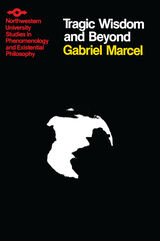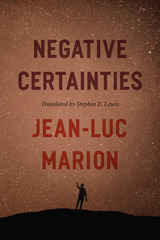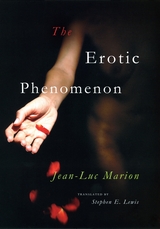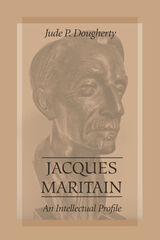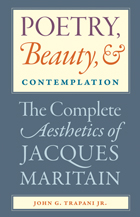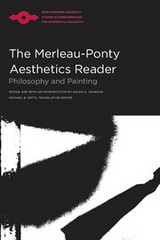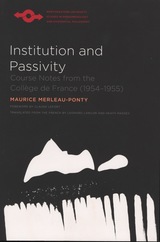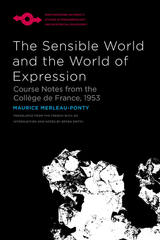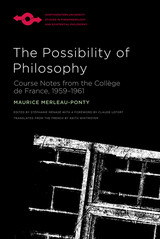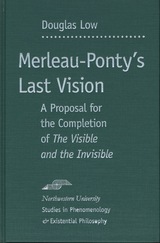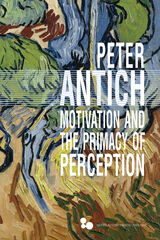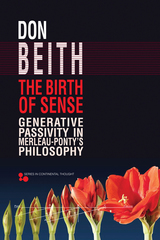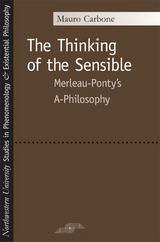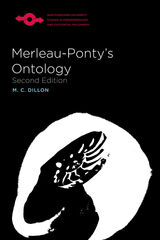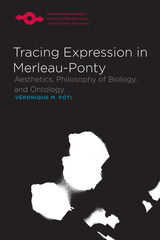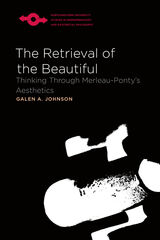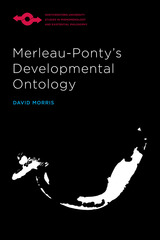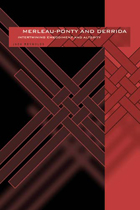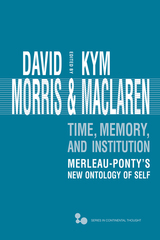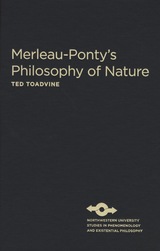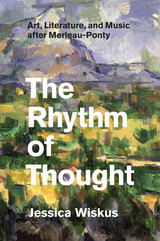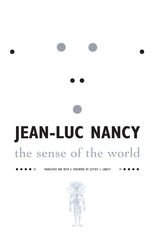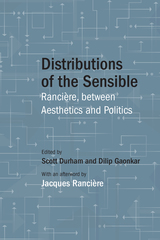The Thinking of the Sensible: Merleau-Ponty's A-Philosophy
Northwestern University Press, 2004
Cloth: 978-0-8101-1363-3 | Paper: 978-0-8101-1986-4
Library of Congress Classification B2430.M3764C375 2004
Dewey Decimal Classification 194
Cloth: 978-0-8101-1363-3 | Paper: 978-0-8101-1986-4
Library of Congress Classification B2430.M3764C375 2004
Dewey Decimal Classification 194
ABOUT THIS BOOK | AUTHOR BIOGRAPHY | TOC | REQUEST ACCESSIBLE FILE
ABOUT THIS BOOK
In this first English publication of a well-known and widely respected Italian scholar, readers will encounter the preeminent interpreter of the works of Maurice Merleau-Ponty engaged in a dialogue of critical concern to contemporary philosophy. In subtle and sensitive language eminently suited to the style and substance of Merleau-Ponty's own writings, Mauro Carbone fashions four essays around a central theme-the relations of the sensible and the intelligible, and of philosophy and non-philosophy-that occupied Merleau-Ponty in his later work.
An original and innovative interpretation of the ontology of Merleau-Ponty--and themselves a significant contribution to the field of Continental thought--these essays constitute a sustained exploration of what Merleau-Ponty detected, and greeted, as a "mutation within the relations of man and Being," which would provide him with the basis for a new idea of philosophy or "a-philosophy." In lucid, often elegant terms, Carbone analyzes key elements of Merleau-Ponty's thought in relation to Proust's Recherche, Hegel's Phenomenology of Spirit, the new biology of Von Uexküll, Rimbaud's Lettre du voyant, and Heidegger's conception of "letting-be." His work clearly demonstrates the vitality of Merleau-Ponty's late revolutionary philosophy by following its most salient, previously unexplored paths. This is essential reading for any scholar with an interest in Merleau-Ponty, in the questions of embodiment, temporality and Nature, or in the possibility of philosophy today.
An original and innovative interpretation of the ontology of Merleau-Ponty--and themselves a significant contribution to the field of Continental thought--these essays constitute a sustained exploration of what Merleau-Ponty detected, and greeted, as a "mutation within the relations of man and Being," which would provide him with the basis for a new idea of philosophy or "a-philosophy." In lucid, often elegant terms, Carbone analyzes key elements of Merleau-Ponty's thought in relation to Proust's Recherche, Hegel's Phenomenology of Spirit, the new biology of Von Uexküll, Rimbaud's Lettre du voyant, and Heidegger's conception of "letting-be." His work clearly demonstrates the vitality of Merleau-Ponty's late revolutionary philosophy by following its most salient, previously unexplored paths. This is essential reading for any scholar with an interest in Merleau-Ponty, in the questions of embodiment, temporality and Nature, or in the possibility of philosophy today.
See other books on: 1908-1961 | Kleinberg-Levin, David Michael | Merleau-Ponty, Maurice | Sensible | Thinking
See other titles from Northwestern University Press

